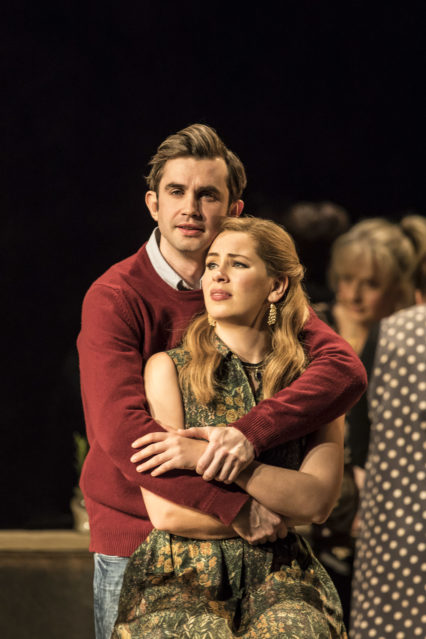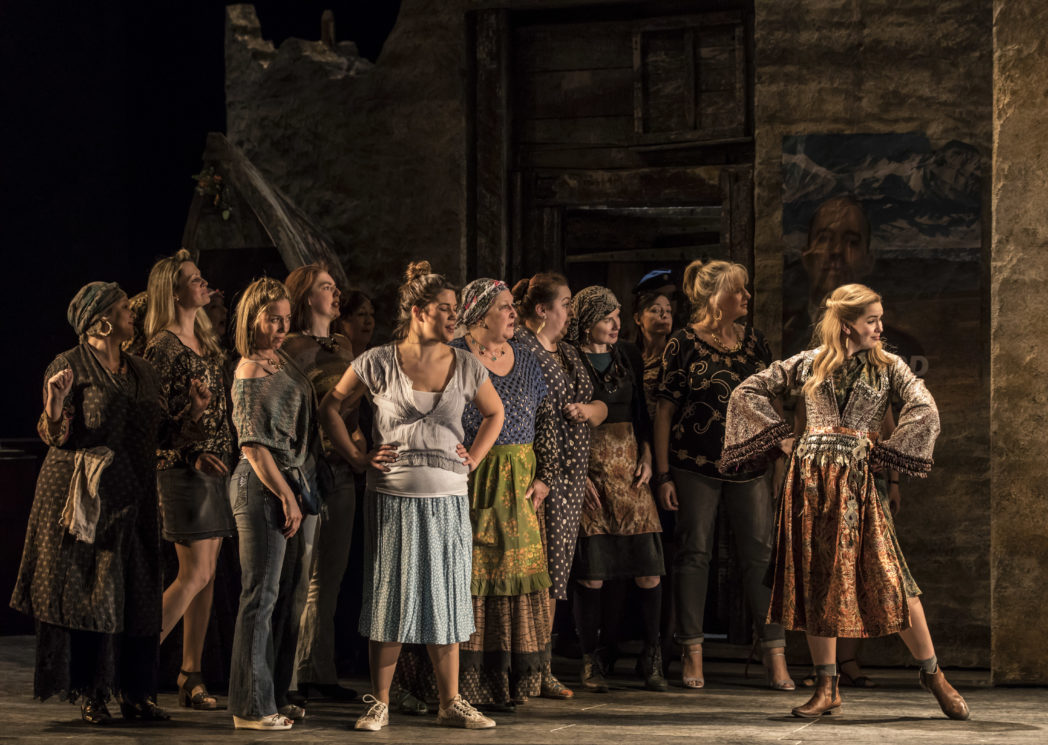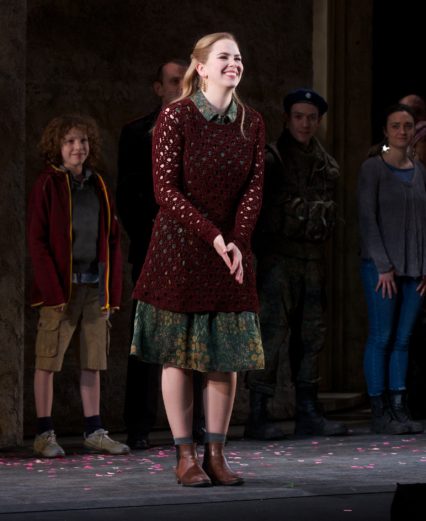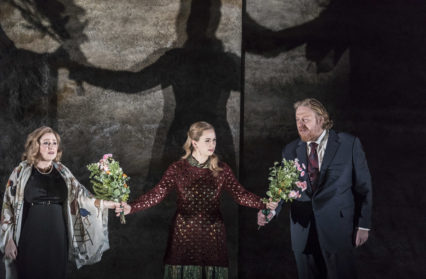Linda Christmas talks with Welsh mezzo soprano Samantha Price about the process of creating a new role in a brand new opera: Perdita in The Winter’s Tale, a new adaptation of Shakespeare’s play for English National Opera, music and libretto by Ryan Wigglesworth, directed by Rory Kinnear.
The Winter’s Tale, English National Opera, Coliseum, London, February 27 –March 14
The Winter’s Tale, a well-received new operatic treatment of Shakespeare’s play, is a thoroughly British affair. One glance at the cast list (below) proves the point. Many of the names have been nurtured by English National Opera’s programmes for young singers. Furthermore, of the seven main singing roles three are Welsh; Neal Davies, Geraint Hylton – and Samantha Price. The latter is the youngest and least experience of the three and although her role is relatively small it is pivotal: Perdita is the baby who caused all the trouble! Her father, a King, doesn’t believe she is his child, insisting that his best friend is responsible for his wife’s pregnancy. His insane thoughts cause the child to be abandoned on a distant shore where she is brought up by a shepherd. She is a princess of course, so she has to fall in love with a prince (not knowing he is a prince) and, with a traditional bit of Shakespearean plotting, ends up united with her remorseful father and – final twist – her mother is brought back to life. (Shakespeare was writing in 1623 when “lieto fine” or happy endings were popular in opera and could be brought about by all sorts of divine or unlikely intervention!)

The reviews (11 of them – see later) of The Winter’s Tale describe Sam Price as “highly professional”, “fresh voiced”, “spontaneous”, “delicious” and “exhibiting a lovely gentle emotion.” Her acting is also praiseworthy: she dances with grace and has a nice way with shy-awkward when it is needed. We have seen in her as Cherubino in The Marriage of Figaro and, in The Winter’s Tale, she is once again required to play the love-struck teenager (this time female) as fond of flowers and herbs as Ophelia. Sam is also experienced at being on-stage silent having played Kate Pinkerton in Madama Butterfly and here again she is present but silent in much of Act 111.
So far, then, she is building on past experience. However, this is her first newly created work. There is no recording to lessen the steepness of the learning curve let alone a video of a performance against which to create your own interpretation. Price pioneers Perdita: an honour for a young singer. She is sufficiently at ease with her luck to accept an invitation (as a Harewood artist) to do a vlog each week during rehearsals. When we met to talk in between rehearsals there was much that she couldn’t show or say, such is a new work’s desire to be kept under wraps, but clutching her mug of tea she was able to gossip about the magic atmosphere throughout the creation of the work, and give some insight to those unfamiliar with the lengthy business of creating an opera:
“Learning a brand new role is frustratingly slow, but this is balanced by the freedom of being something new. You don’t feel pressured to do it the same way as someone else, or to have to put your stamp on it to make it different. I began by bashing the piano and then having a couple of coaching sessions and then could continue learning with the help of Sibelius, a computer generated programme.
Becoming pitch-perfect is something that happens as the notes lodge in the muscle memory, and then for the first month of rehearsals there is only piano accompaniment. During this period it is possible for a sympathetic pianist to enhance the volume of a note to help you pitch your next note. It is difficult music, so you might need help with a phrase. The intervals are not regular and the pitches are not ones you have sung before. If you sing Mozart or Handel and you are learning a new piece by the same composer there is some predictability. But with a new piece it takes a while to get into that world.
The next hurdle is hearing the orchestral version for the first time. This doesn’t affect the notes which are by then lodged in the muscle memory, but does affect the cues. At times I could hear my colleagues humming a note that they need a few bars before their entrance. That was reassuring.”

Sam didn’t find it difficult to sing Shakespeare’s words because for much of the time she wasn’t conscious of singing Shakespeare. Ryan Wigglesworth had pared much of the text down to natural speech:
“I had never seen or read the play before. Maybe if I knew the play I’d feel aggrieved that there are not more Shakespearean phrases but I only know what I hear. I do sing: ‘Nothing so well or so better’ which is hardly a modern phrase – and there was one moment, in rehearsal, where the language was not clear and the director had to explain to the chorus what was going on. That’s at the point of the ritual engagement dance where the men are lined up against the women and the men want to go off and won’t tell the women where they are going, which naturally makes them suspicious. So there’s a bit of a spat. It’s simple really, but Shakespeare’s words needed an explanation. The story line is very clear throughout. It’s a reduced version of the best bits!”

The evening is short, one act of 55 minutes and one of 45 minutes, and the action moves at speed; there is no lingering on the high dramatic moments. To me, the third act seems rushed and the recognition scene between father and daughter goes for nought. We were told the setting is Azerbaijan around 2000 for Act 1. That is a Muslim country but presumably secular enough to wear dull looking western-clothes, with the King very much a military autocrat surrounded by marble statues. The culture there is meant to be sufficiently different so that it doesn’t seem odd when the King consults the oracle to find out if his wife is guilty of adultery (and then ignores the result). The rustic second act is meant to be a contrast, but even here the King wears army gear and dark glasses and the peasants give odd salutes, twice beating their chests above the heart. He, Polixenes, is as bad as his one-time friend in the aggressive way he handles his son. The contrast is illusory.
And the music, what of the sound world? There are seductive instrumental solos particularly for flute and clarinet. Samantha says of it:
“I am the least qualified person to answer this question. I am not a composer or a music historian and I don’t spend my days comparing scores. I could listen to act 1 because I am not in that act and I found the music engaged so well with the drama. I love the way Ryan uses percussion. In the argument between Leones and Hermione you can hear cracks of the whip. I don’t know what is creating it, but you can hear the tension. The orchestra is very big, but the piece is so sympathetically written the singers don’t feel overwhelmed by the sound. I find it easy to get over clashing notes and so on because it makes sense of what is on stage. I suppose I could describe the sound world as accessible contemporary.”
Shakespeare’s plays are an attractive subject for composers because of their canonical status; because they offer strong characters and plot lines, narrative drive, powerful emotions, and pivotal scenes – and because they are out of copyright. But operatic adaptation is hazardous. Music scholars suggest that there have been as many as two hundred works inspired by his plays. Only a handful is regularly performed. Opera base, which collates statistics of performances around the world, shows that in five seasons from 2009/10 to 2013/14 only Verdi’s Othello (22); Macbeth (27) and Falstaff (31) appear in the top one hundred.
Only two composers have used Shakespeare’s words, Alexander Goehr’s Promised End (2010), a version of King Lear with a libretto by the English scholar, Frank Kermode, and Benjamin Britten’s A Midsummer Night’s Dream (1960) with a libretto by the composer and Peter Pears. Of the two, only Britten’s work is regularly performed. Despite this daunting record the temptation remains. Luke Styles recently did an all male chamber version of Macbeth for Glyndebourne and that house will be hosting Brett Dean’s Hamlet later this summer. The Winter’s Tale might be Wigglesworth’s first opera, but he conducted the premiere of Goehr’s Promised End for English Touring Opera, so is no stranger to operatic Shakespeare.
Of the eleven reviews that have appeared so far not all award “stars”, but those that did offered five 4-stars, three 3-stars and one 2- star. All praised the singers as uniformly excellent, and most reviews admired the director’s debut as “clear-headed and solid”, “intelligent and brimming with confidence”; and the set as ingeniously circular. Where the “stars” divide is over the pared down, fast-moving story and the pared down libretto, with Shakespeare’s words served as thinly as white truffle. The music was for some exceptional and for others it accompanied the drama but did not seem to “take charge.” Overall the concensus is that this is an accomplished first opera.
Opera in 3 acts: Ryan Wigglesworth, composer, conductor, librettist (after Shakespeare’s play); Rory Kinnear, Director; Vicki Mortimer, set designer; Moritz Junge and Seb Lalljee, costume designers; Jan Clark, lighting designer; Imogen Knight, choreographer.
Cast: Leontes, King of Sicilia, Iain Paterson; Hermione, his wife, Sophie Bevan; Perdita, their daughter, Samantha Price; Polixenes, King of Bohemia and Leontes’ boyhood friend, Leigh Melrose; Florizel, his son, Anthony Gregory; Paulina, Hermione’s lady-in-waiting, Susan Bickley; Antigonus, her husband, Neal Davies; Mamillius, Leontes and Hermione’s son, Zach Roberts; Two guards, Geraint Hylton, Michael Burke; servant, Paul Napier-Burrows
BBC Radio 3 (Opera on 3) will broadcast The Winter’s Tale on Saturday, May 20 2017
Tom Service interviews Ryan Wigglesworth and Rory Kinnear, Music Matters, Saturday February 25: http://www.bbc.co.uk/programmes/b08g47yt












